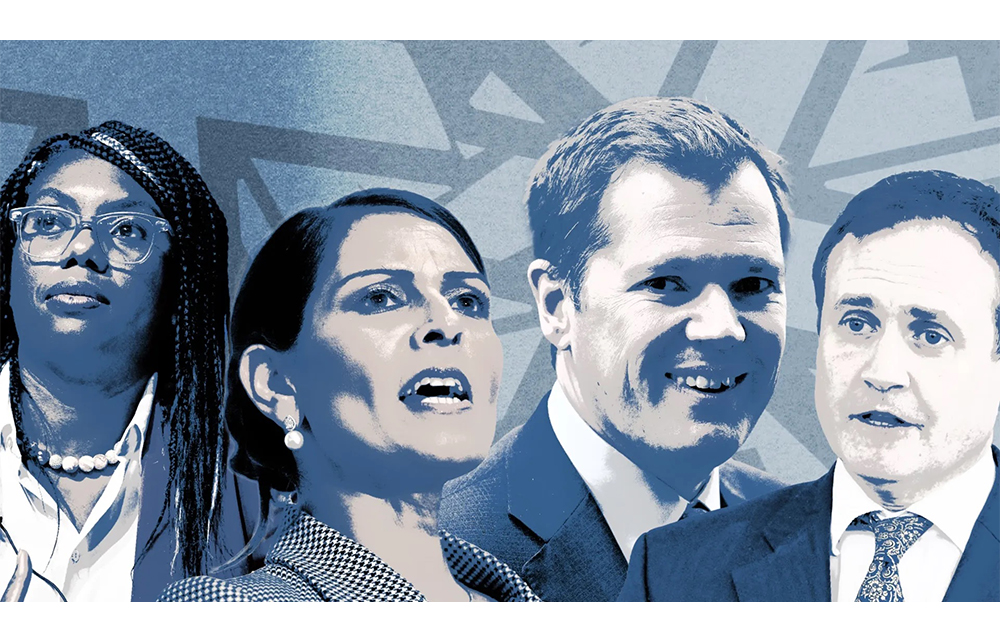Conservative MPs who hoped for a relaxing summer break have had a nasty shock: their phones have been ringing on repeat. With just 121 MPs in their corner, the Tory leadership candidates are fiercely competing for each one’s backing. ‘They call on bank holidays when I’m with my partner,’ complains one old-timer. ‘I’m trying to relax by the pool – then I get James Cleverly on the line,’ adds another.
The decision to opt for a long contest lasting until November was meant to give candidates a break. Kemi Badenoch took one, but was attacked for missing a hustings in the north – she reacted with trademark fury and defended her right to switch off. It’s unclear if any of the six have come back refreshed. They are about to enter what one old hand calls ‘the most critical week, in terms of momentum’. There will be two knock-out rounds, then they have a month to sell themselves to MPs. The race will then be reduced to just two contenders before party members pick their winner.
‘I’m trying to relax by the pool – then I get James Cleverly on the phone,’ says one Tory
MPs haven’t been rushing to take sides, some seeing the race as a lack-of-talent contest from a party paying the price for chewing up and spitting out too many leaders. ‘It’s been a fantastic summer being inspired by the battle of Olympians,’ jokes one. ‘It’s just a shame this doesn’t apply to the leadership contest.’ Others have been impressed by Robert Jenrick. ‘Rob has the slickest campaign and has been making the most of the summer,’ says an MP backing another candidate. ‘He’s not wasting time.’
Yet the contest is seen as wide open. ‘Anyone could win – other than Mel [Stride],’ argues a shadow cabinet member. ‘With every one of those five, they want to be leader and you can chart a path.’ When candidates are eliminated, horse-trading will follow – but it’s hard to see who ends up backing whom, adding to the contest’s unpredictability.
While Stride has a loyal base, his candidature is generally not being taken that seriously yet by the bulk of the party. ‘The perception is that Mel is positioning to be shadow chancellor,’ says a former cabinet minister. So his real opposition would be the others tipped for this role: Claire Coutinho, the shadow energy secretary, and other colleagues with Treasury team experience – Laura Trott, Andrew Griffith and Jesse Norman. However, Stride supporters say he is in it to win it – pointing to the David Cameron example as proof that a long leadership contest can allow for surprising results.
Jenrick and Badenoch, the two favourites, are expected to make the final four. Tom Tugendhat, who ran against Rishi Sunak, is expected to profit from the centrist wing of the party. Several MPs believe only one of Cleverly, the former foreign secretary, and Priti Patel, or ‘the Pritster’ as she was called by Boris Johnson, who regards her as a rare loyalist, is likely to make the final four. Those around Sunak (who is still party leader) believe Patel behaved well during the tumult but Cleverly is winning over MPs with his own unity pitch.
Whoever makes the final four, a rough choice is forming in relation to the various candidates. Is a firebrand needed to shake up the status quo? Or should the party follow Labour’s example and go for a reliable, inoffensive option – and wait for Keir Starmer to trip up? Jenrick and Badenoch are seen to be the two higher-energy options, able to steal some of Nigel Farage’s thunder. ‘But at some point we should think about Lib Dem voters,’ says a One Nation Tory. This makes the case for a more mellow leadership.
All this comes down, in part, to deciding why the Tories lost – and reflecting on how bad the defeat was. But even copying the Labour playbook seems complicated. Starmer entered No. 10 on the back of Tory misfortune, but the Conservatives now have to battle with Reform to win over disillusioned Labour voters, while Reform threatens to poach more Tory seats in the future. Initial polling suggests Reform is already picking up support Starmer has lost. Team Farage regard Badenoch as their biggest competition, but doubt she’ll get past the MPs.
Among MPs, a question is being asked: which candidate could take the fight to Starmer and Farage – and score points against both? It’s a test that tends to benefit Badenoch, the candidate who most regularly comes out on top in polls of party members. She will officially launch her campaign next week with the slogan ‘truth – responsibility – country’. In contrast to some of the other campaigns, she isn’t planning to announce intricate policy but instead start with founding principles.
After Sunak was elected leader, Badenoch became the bookmakers’ favourite to succeed him. But she has a fight on her hands to win over enough MPs to make the final two. ‘If you think Kemi is the answer, you still will after the summer holiday, but if you think she is aloof and blunt then her team hasn’t done much to change that yet,’ a former minister says. Even her supporters fear that rival camps will try to rig the race so members – who are likely to choose her – never get the chance.

In 2019, Johnson demonstrated that the frontrunner can go on to win the leadership contest. He did so by learning from the mistakes that saw him drop out unexpectedly in the prior contest, when Michael Gove abandoned him and MPs decided their suspicions about him being a lone rider were correct. To reach the membership stage, the candidates will need to show that they can perform well with the public – and bring colleagues along with them.
In this race, something else is missing: the involvement of Gavin Williamson, the Tory Machiavelli whose whipping skills got both Theresa May and Johnson over the line. He – along with other seasoned campaigners – is thought to be sitting the contest out, with visible results. ‘There isn’t a serious parliamentary operation behind any of them,’ says one MP. ‘If there was, at least one of them would have 20 public supporters by now. It should be achievable.’
This speaks to perhaps the biggest point: the feeling that this race isn’t to be taken too seriously because MPs think the winner won’t last more than a couple of years and that the defeat in July was of such a scale that this is a two-, perhaps three-leader problem. The party has two months to find its next leader. But the hunt for its next Prime Minister may be a far lengthier task.
Listen to more from Katy Balls on Coffee House Shots, The Spectator’s daily politics podcast:








Comments